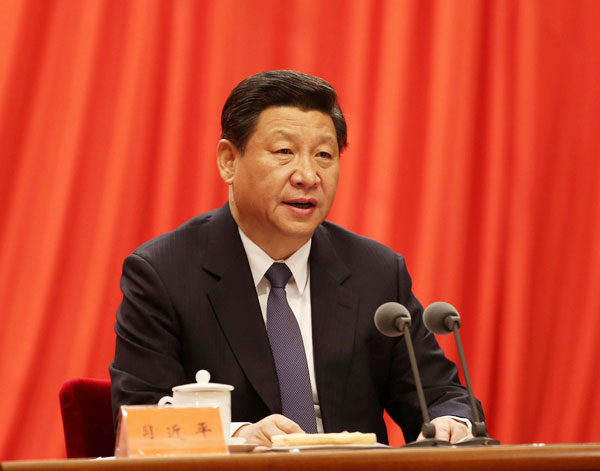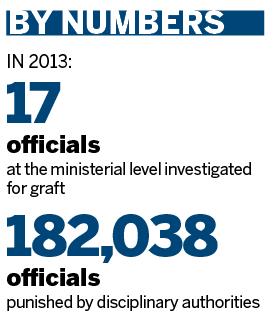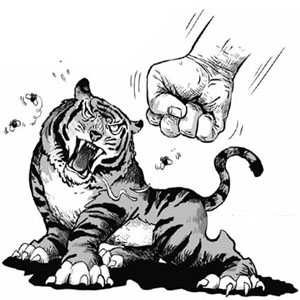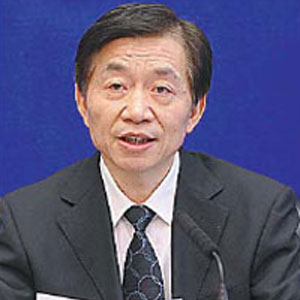Respect for clean-governance regulations must be observed, president tells officials
|
 |
|
Chinese President Xi Jinping, also general secretary of the Communist Party of China (CPC) Central Committee and chairman of the Central Military Commission, addresses the third plenary session of the 18th CPC Central Commission for Discipline Inspection (CCDI) in Beijing, capital of China, Jan. 14, 2014. [Photo/Xinhua] |
President Xi Jinping called on Tuesday for the Party's disciplinary mechanism to be reformed as China's anti-graft campaign expands.
Officials should abide by the clean-governance rules, and violators must be punished strictly, he said.
"The regulations should not become paper tigers or scarecrows," the president said.

Xi was speaking at the Third Plenary Session of the 18th Central Commission for Discipline Inspection of the Communist Party of China.
The meeting, held from Monday to Wednesday, is being attended by chief disciplinary officials of provincial governments, ministries, State-owned enterprises and public institutions.
Xi said the anti-graft system should be reformed to ensure that power can be supervised effectively and that disciplinary authorities can work independently.
He spoke highly of anti-graft work carried out last year, saying that investigations into corrupt officials should continue to be enhanced this year.
Officials should keep the public's interests in mind and improve their work style to get close to the people, Xi said.
Public funds should be spent for the people, and public power should be exercised for the people, Xi said.
He said corruption remains rampant on many fronts, requiring long-term efforts and firm determination from disciplinary authorities.
Wang Qishan, chief of the CPC Central Commission for Discipline Inspection, said government officials should enhance supervision of their subordinates and the main leaders should be held responsible if major and important corruption cases occur.
Local Party authorities should report their work on clean governance to higher-level disciplinary bodies, Wang said at the conference, adding that it would be considered dereliction of duty if Party authorities did not strengthen anti-corruption efforts.
Disciplinary authorities will review the situation by inspecting reports of officials' declaration of assets, Wang said.
He told disciplinary officials to keep a close watch on corruption activities involving government officials, including bribery, embezzlement, dereliction of duty and abuse of power.
"We should have zero tolerance for corruption," Wang said.
More than 180,000 officials were punished by disciplinary authorities last year, an increase of 13.3 percent from 2012, according to the commission.
It will introduce further measures, such as banning government meetings at scenic spots, Wang added.
Under a frugality campaign launched by the CPC Central Committee in December 2012, officials were ordered to clean up undesirable work styles such as formalism, bureaucracy, hedonism and extravagance.
Disciplinary watchdogs will improve cooperation with judicial and audit authorities to investigate corrupt officials, Wang said.
To prevent local officials from interfering with corruption investigations, higher-level disciplinary authorities will have the final say on the promotion of lower-level disciplinary officials, he said.
Wang Huanchun, director of the case management department under the discipline inspection commission in Jiangsu province, said it is sometimes hard to fight graft because corrupt officials adopt new methods to take bribes.
"Instead of taking money directly, some corrupt officials accept stocks or ask other people to keep the bribes for them," Wang Huanchun said.
Zhu Lijia, a professor of public administration at the Chinese Academy of Governance, said the government has made efforts to gain public trust through fighting corruption and increasing transparency.
"By fixing loopholes in public administration, such as forbidding the buying of postcards with public money ahead of festivals, the authorities are gradually locking power into the cage of regulation," he said.
Disciplinary authorities are improving anti-graft rules and carrying out a pilot project on the disclosure of newly promoted officials' family assets, Zhu added.
Cang Wei in Nanjing contributed to this story.
anbaijie@chinadaily.com.cn
Related reading
 |
 |
| Long-term anti-corruption | Thousands of officials punished |
|
|
|
|
|
|
|
|
